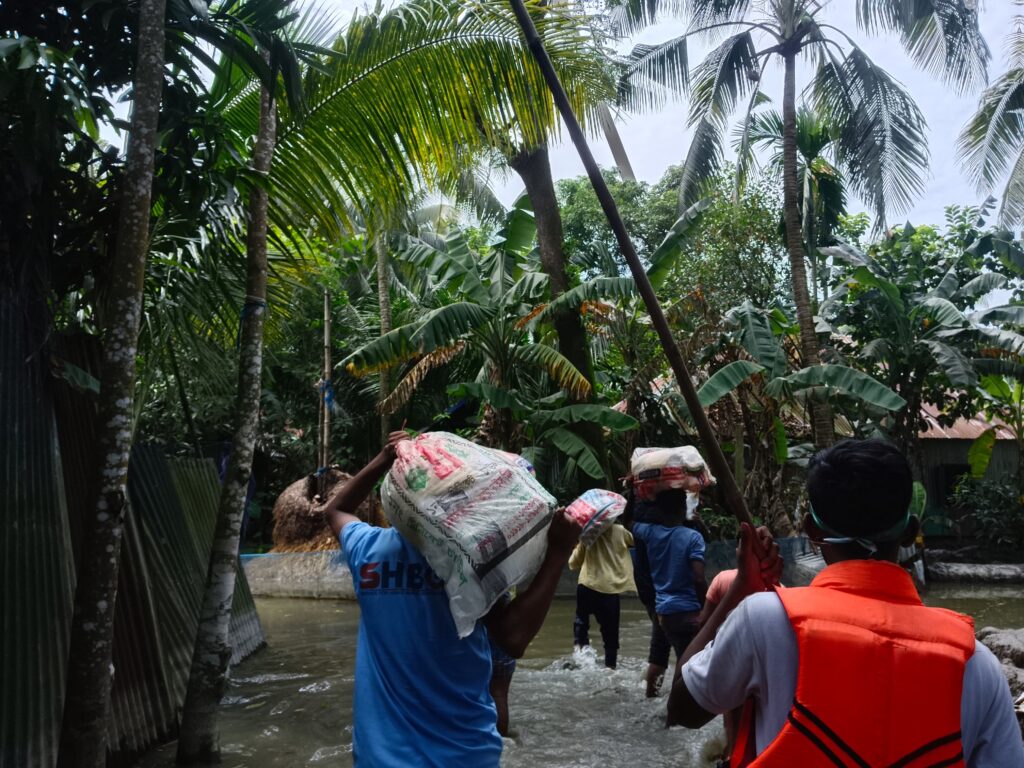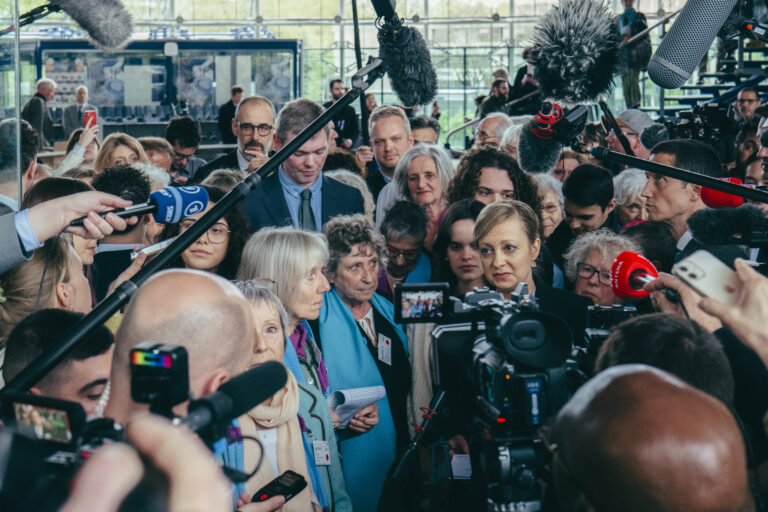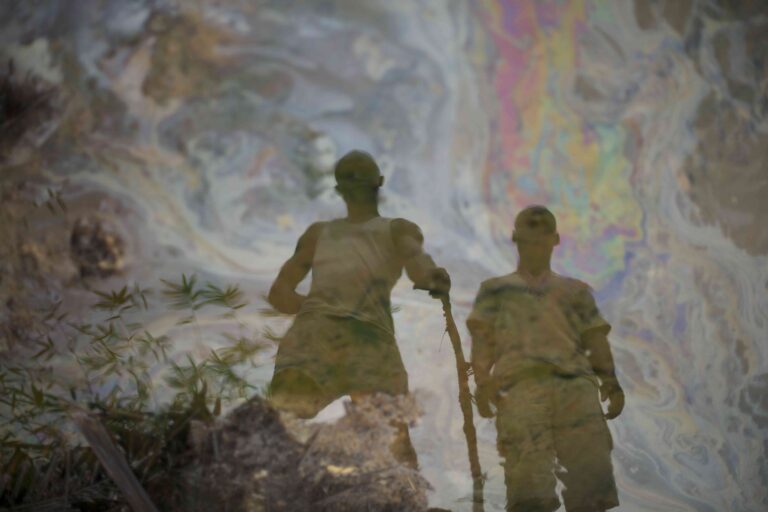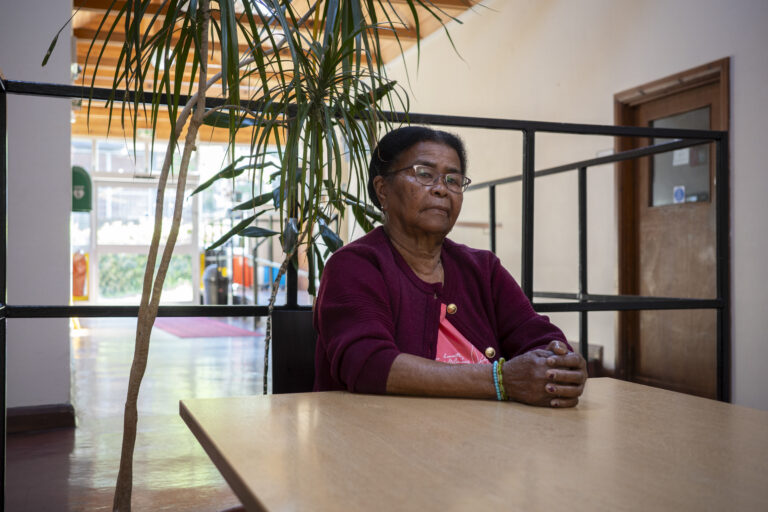On 21 August 2024, 21-year-old Sohanur Rahman reached his neighbourhood in the district of Noakhali, in southeastern Bangladesh, after hours of nonstop monsoon rains.
Heavy rainfall and upstream torrents from India caused Bangladesh’s rivers to burst through their banks. Vast areas were submerged, destroying the homes and livelihoods of millions of families.
According to the National Disaster Response Coordination Center, the floods affected 5.8 million people and displaced more than 500,000. The UN reported that 75 people died, making these the worst floods to hit eastern Bangladesh in 34 years.
Rahman’s home was left with no electricity. He went to the nearest bazaar to buy candles, which was also the only place with a functioning mobile tower. There, he met some of his fellow volunteers – members of the youth-led Service for Human Being Organisation (SHBO).
Rahman learnt that many of the neighbours’ houses were flooded with “six or seven feet of water”. “They had to swim out of the house in the middle of the night,” Rahman recalls. “After realising the severity of this situation, I joined forces with the other volunteers and started rescuing the people around my local area.”
“Our house was only a foot underwater, so we were very fortunate,” he adds.
In 2024, Bangladesh ranked ninth among the most vulnerable countries to extreme weather events, according to the World Risk Index. The country is also located in one of the world’s most densely populated deltas. With sea levels rising 3.8 to 5.8 mm per year above the global average, there is a sense of urgency in Bangladesh.
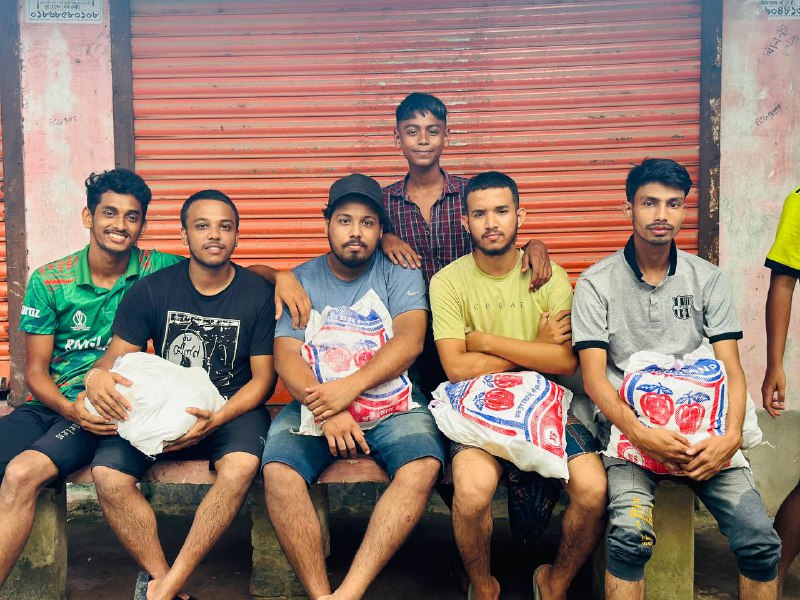
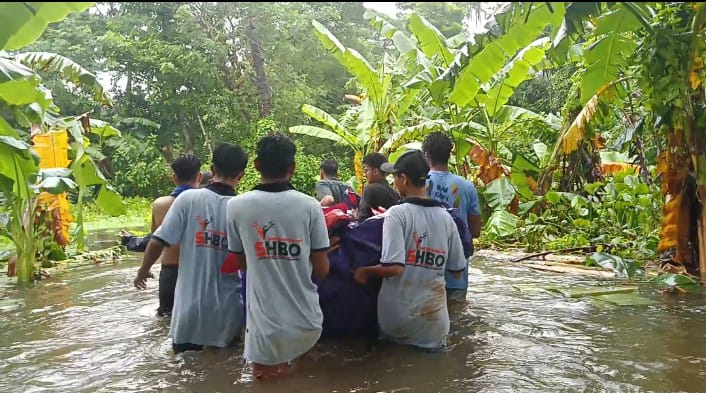
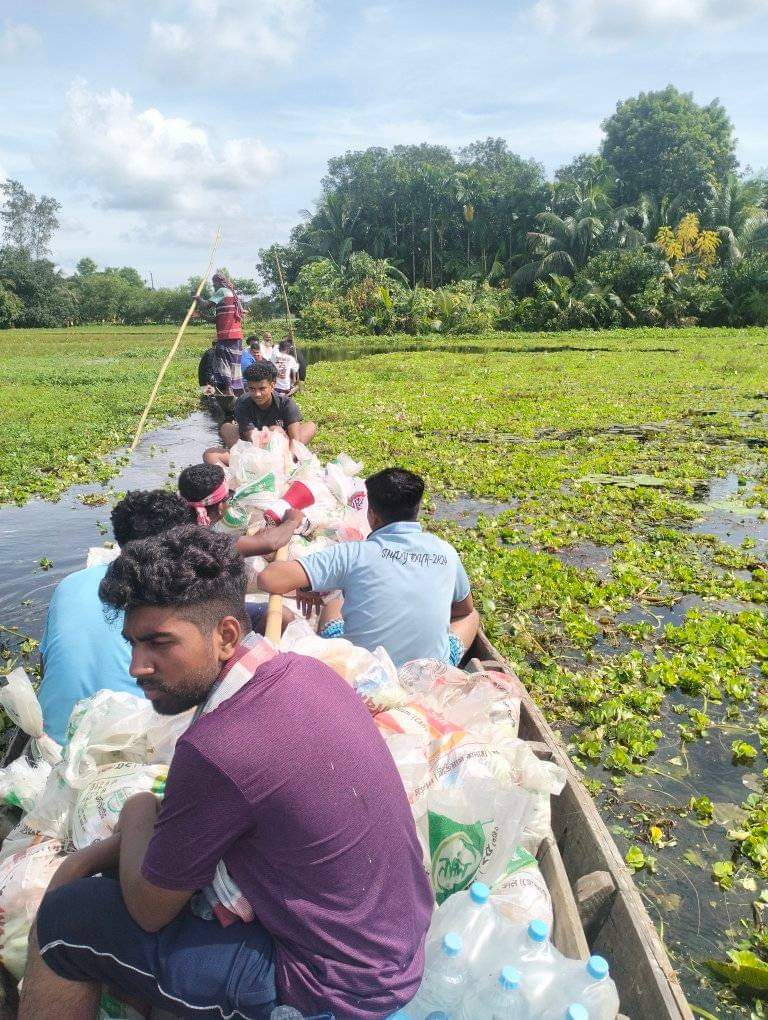
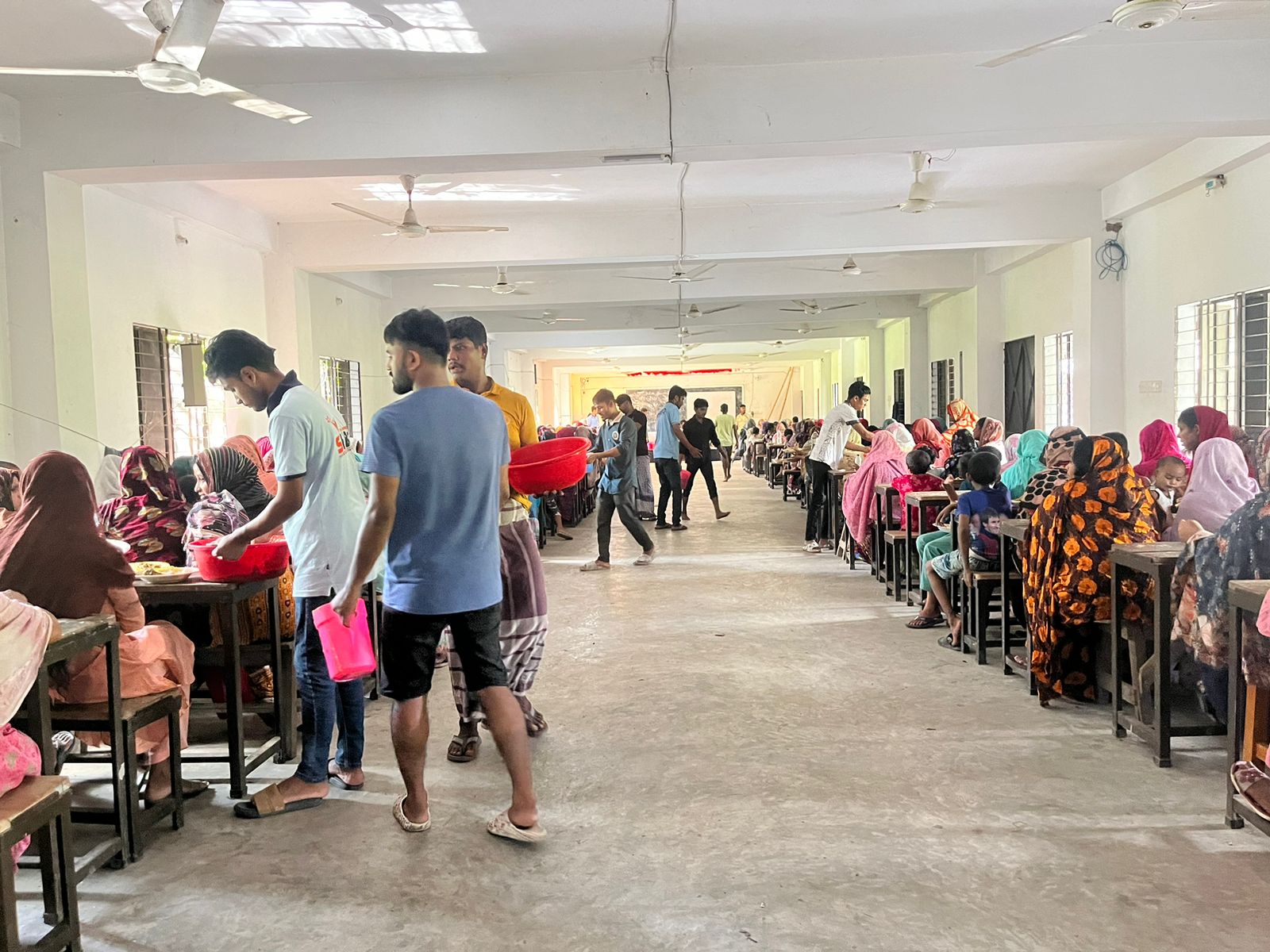
One of the main challenges in helping communities affected by last year’s flood was reaching them. Mahmuda Sultana, programme director of Oxfam in Bangladesh, explains that it could take up to 72 hours to arrive at affected villages.
This is where the initiative of local youth volunteers made a difference. Sultana believes that Bangladeshi youth have always wanted to help the rest of the community, but that it is now “coming more to the surface because of … the demographic dividend.” Gen-Z Bangladeshis account for 28 per cent of the population. “Without any training, any resources, they just had the spirit to support the community, and they just went,” she says.
The August floods also came in the aftermath of pro-democracy protests in Bangladesh in July, spearheaded by university students. The movement led to the ousting of the prime minister, Sheikh Hasina. Sultana says this political environment made young people more aware: “Soon after democracy was restored, disaster happened. They jumped into this disaster to save the country.”
26-year-old Abdullah Aunnur, who goes by Nur, was in his home district of Cumilla collecting money with friends to help neighbouring communities, including Rahman’s district of Noakhali. Whilst raising funds, he remembers a child bringing him a piggy bank containing 200 to 300 takas (£1.23 to £1.85). “She told us ‘I must contribute something,’ so she gave her piggy bank to us,” he recalls.
Nur and his friends, who did not work for an official organisation, would wake up early in the morning to distribute supplies bought from local grocery stores and would return in the evening.
Having recently finished his master’s in environmental science, Nur explains: “We study in universities almost free of cost. That comes from the taxes, from the people. So, it’s our responsibility to work for them, for the betterment of society.”
For the first one or two days, we were the only ones working in the area
Sohanur Rahman
Rahman, who has also been the vice-president of SHBO since January 2025, juggled helping his family and coordinating with the other volunteers. “For the first one or two days, we were the only ones working in the area,” he says. “Our volunteers were so energetic, they didn’t even sleep at night.”
“This is not just some work. They were all our people,” he adds.
According to SHBO, they rescued over 300 people and provided aid to over 3,000. Their priority was providing drinking water, dry food, medicine and hygiene supplies to those in shelters. Sultana says that preparing shelters with enough reserves is crucial to convincing people to safely leave their homes in advance.
SHBO also started a community kitchen to provide warm meals to those in the shelters. Initially catering to around 500 people, they quickly expanded to 1,500 per day. Rahman says this was partly thanks to the funding of the international charity, ActionAid.
Farah Kabir, director of ActionAid Bangladesh, says the organisation “has always trusted the youth and their agency… We never ruled them out.”
Oxfam also launched a volunteer programme, which so far has only been active in the Barguna district. 3,000 young volunteers have received humanitarian response training from Oxfam and now form a volunteer pool that can be called when needed.
“We can now quickly do the analysis sitting at our desks because community volunteers are giving us the data,” Sultana says. “That’s how we start our initial work within 24 hours.”
While we are preparing, the rest of the world is not moving away from its fossil fuel dependency
Farah Kabir
Now, at the beginning of 2025’s monsoon season, Sultana says that although the trained young volunteers are better prepared, the rest of the community is not. “Psychologically, maybe they are stronger, but as resources go, they are not in a better position,” she says.
Kabir says that “anticipatory action is critical,” and that ActionAid is also preparing to work with the youth again. But “while we are preparing, the rest of the world is not moving away from its fossil fuel dependency.”
Despite the acclaimed role Bangladesh’s youth played in responding to last year’s floods, they do not have a seat in disaster management committees. These are groups formed by law at every administrative level when a disaster occurs.
Rahman says that SHBO has also tried to create a community response network, but has received no government support so far. He says the volunteers feel the burden of the lives they couldn’t save, but quickly adds that “there was a boy named after one of the volunteers”.
“It was small stories like this that inspired us to do the work all along.”

